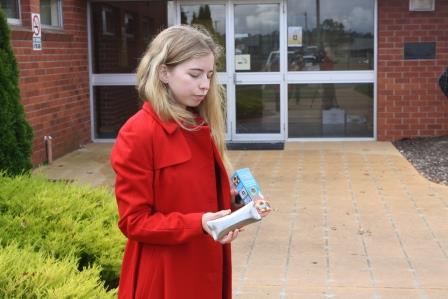Firebox Project targets winter woodsmoke pollution

Firebox Project targets winter woodsmoke pollution
A new research project that aims to find out whether widespread use of a small firebox device will reduce winter air pollution is about to begin in the Tasmanian town of Perth.
A new research project that aims to find out whether widespread use of a small firebox device will reduce winter air pollution is about to begin in the Tasmanian town of Perth.
Researchers from the Menzies Research Institute Tasmania, an institute of the University of Tasmania, are asking all residents of Perth with a wood heater to place a free canister, the equivalent of catalytic converters used in car engines, in their heater this winter to reduce pollution.
The researchers are on the ground in Perth today to talk to the community about the study, which follows recent findings by Menzies Environmental Health researcher, Dr Fay Johnston, that reducing smoke emissions from chimneys improves air quality and health in the whole community.
"The catalytic devices have been tested in individual fireboxes, burning under optimal conditions," Dr Johnston said.
"Using them in a whole community like this is something completely new. We really don't know what sort of impact to expect.
"What we do know is that if Perth residents successfully improve their outdoor air, respiratory complaints, hospital admissions and longer term risks of heart disease will all be reduced in the town."
Perth is one of many rural towns in Tasmania where poor air quality during winter months is common because of smoke accumulation from wood heaters. It is a good location for the FireBox Project because the EPA Tasmania already monitors air quality in the town and in two adjacent towns, Longford and Hadspen, with similar winter air quality issues.
In June, a team of volunteers will visit every house in Perth to ask if they can place a SmartBurn® canister inside the firebox of their wood heater. The canister is designed to make burning more efficient so that harmful components of wood smoke are more likely to get burned for energy than emitted as pollution.
The canisters also reduce creosote build-up in chimneys and on glass doors of fire boxes. The non-toxic, non-corrosive devices have been commercially available for many years in Tasmania, retailing for around $50. There are no known risks associated with using the devices. Perth residents have the opportunity to have them installed for free.
The success of the FireBox Project will depend on the participation of all houses in the town with a wood heater. "We hope that everyone with any kind of wood heater will take advantage of this opportunity. It's free, it's safe, and once installed you can forget about the device altogether. It will work for around three months and no changes are needed in the operation of the heater," Dr Johnston said.
Menzies researchers will maintain contact with a sample group of willing participants to gather feedback about the experience of having the device in their heaters.
The FireBox Project is funded by a grant to Menzies from the Centre for Air Quality Research and Evaluation (CAR). CAR is Centre for Research Excellence funded by the NHMRC. The manufacturer of SmartBurn® donated the products to be used in this research project. The company has no active role in the study.
Like all participant studies conducted by Menzies Research Institute Tasmania, the details of individual participants will be kept secure and confidential. Reports from the FireBox Project will not identify individual people or households.
Available for interview, pics, vision in Perth today:
- Dr Fay Johnston, GP and Environmental Health Researcher, Menzies Research Institute Tasmania
- Olivia Johnston (pictured with a SmartBurn canister), University of Tasmania Honours student researching the community-wide use of the firebox product to reduce outdoor air pollution
WHEN: 9 - 11.30am, Wednesday 14th May, 2014.
Contact: Miranda Harman
Communications Manager
Menzies Research Institute Tasmania
(03) 6226 7751
0427 199 562
Miranda.harman@utas.edu.au
Contact:
Phone:
Email: